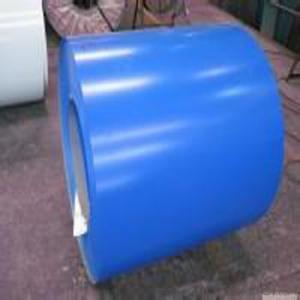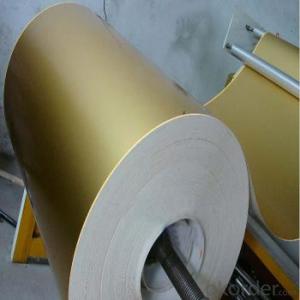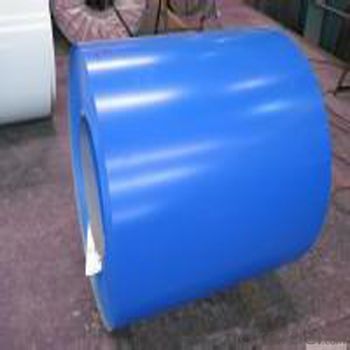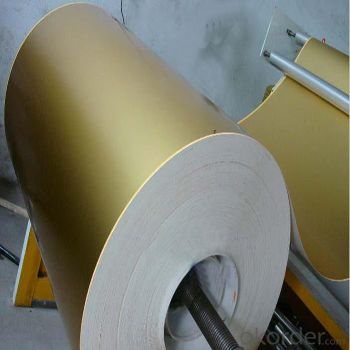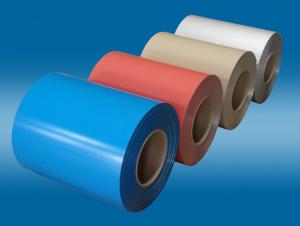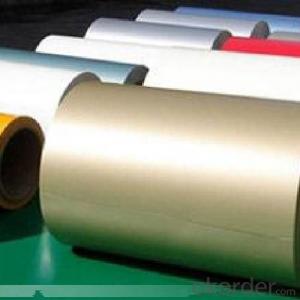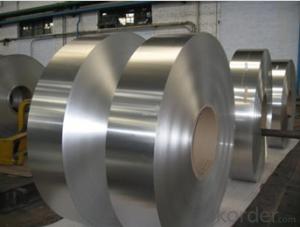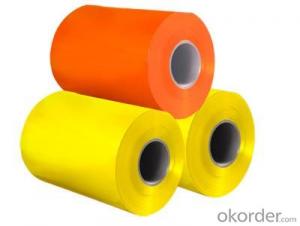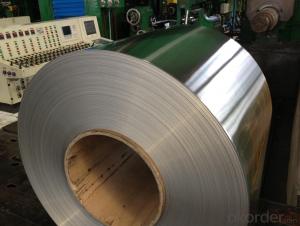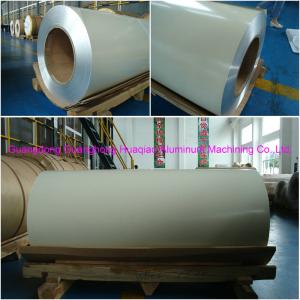Wholesale Painted Aluminum Coil - Prepainted Coils, Sheets, and Strap
- Loading Port:
- Shanghai
- Payment Terms:
- TT OR LC
- Min Order Qty:
- 100 m.t.
- Supply Capability:
- 100000 m.t./month
OKorder Service Pledge
OKorder Financial Service
You Might Also Like
Description
ALUMINIUM COIL
ALLOY: AA1***
AA3***
AA5***
TEMPER: H14 H16 H18 H22 H24 H26 H32 O/F
THICKNESS:0.03MM-3.0MM
WIDTH: 30MM-1700MM
COATING: PE(POLYESTER),PVDF,EPOXY
STANDARD: GB/T 17748-1999
2.Application
This product is used for ACP, Ceiling panel, insulation panel, sandwish panel, rolling shutter and so on.
3. Why you can choose us?
We can promise best quality and price!
4.Pictures
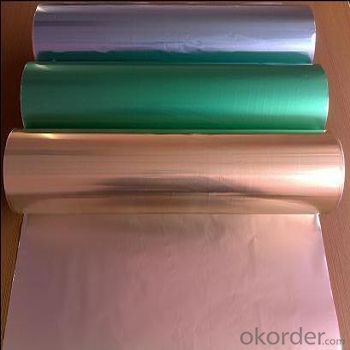
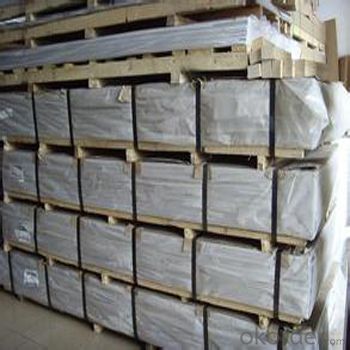
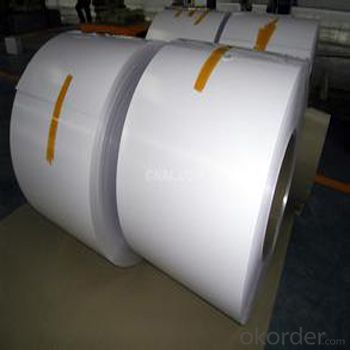
5.FAQ
1)what is aluminum?
Aluminium (or aluminum; see spelling differences) is a chemical element in the boron group with symbol Al and atomic number 13. It is a silvery white, soft, nonmagnetic, ductile metal. Aluminium is the third most abundant element (after oxygen and silicon), and the most abundant metal in the Earth's crust. It makes up about 8% by weight of the Earth's solid surface.
Aluminium metal is so chemically reactive that native specimens are rare and limited to extreme reducing environments. Instead, it is found combined in over 270 different minerals.The chief ore of aluminium is bauxite.
2)What's kind of payment term we can supply?
CIF,CFR, FOB and other.
3)Can we supply samples?
Yes, we can!
4)What can you do if you have other quastions?
You can contact us freely at any time!
- Q: What is the typical price gap between purchasing new aluminum coils versus used ones?
- <p>The price difference between new and used aluminum coils can vary significantly based on factors such as the quality of the used coils, market demand, and the specific grade of aluminum. On average, used aluminum coils can be 20-50% cheaper than new ones. However, this is a broad estimate and actual prices can fluctuate. It's essential to check current market prices and consider the condition of the used coils before making a purchase decision.</p>
- Q: Are there any restrictions on the coil flatness of aluminum coils?
- Yes, there are restrictions on the coil flatness of aluminum coils. The industry standards specify acceptable tolerances for coil flatness to ensure the quality and usability of the aluminum coils. These restrictions help prevent any deformation or irregularities in the coils, ensuring they meet the required specifications for various applications.
- Q: I take an extracurricular aircraft class, and I got the okay to take some old painted sheet aluminum for another project I'm working on. The problem is, what I'm using it for I need bare aluminum. I heard around that air crafts are painted with something that regular (store-bought) paint stripper can't remove. Is this true? I am aware of the fact that stripping something like that will result in a toxic paint sludge, so I've taken precautions for that. I just need to know if heavy-duty paint stripper from Home Depot will do the job. Thanks :)
- Go to an automotive paint store like Sherwin Williams Auto Paints, buy a stripper for the type of paint on the aluminum. Many are epoxy or special acrylics like acry glo or jet glo paints and home paint strippers usually won't phase those paints. A methylene chloride mixed with a soap or wax carrier will work but is a hazmat item and has to be disposed of properly but it won't be corrosive to the aluminum. Dupont, Sherwin Williams, and others make the proper strippers. You might even find some at an RV or Boat supply.
- Q: Can aluminum coils be used for marine applications?
- Yes, aluminum coils can be used for marine applications. Aluminum is a popular material choice for marine applications due to its excellent corrosion resistance in saltwater environments. It has a natural oxide layer that forms on its surface, providing protection against corrosion. Aluminum coils are commonly used for marine applications such as boat hulls, decks, and structures. Additionally, aluminum is lightweight, which contributes to fuel efficiency and improved performance in marine vessels. Its high strength-to-weight ratio makes it an ideal choice for constructing boats and other marine equipment. However, it is important to select the appropriate grade of aluminum alloy that is specifically designed for marine applications to ensure optimal performance and longevity.
- Q: How are aluminum coils used in the production of electronic devices?
- The production of electronic devices heavily relies on aluminum coils, which perform a crucial role. When it comes to manufacturing the internal components of electronic devices like transformers, inductors, and electromagnets, aluminum coils are the go-to material. These coils are formed by winding aluminum wire around a core, creating a compact and efficient conductor for electrical currents. Transformers make use of aluminum coils to transfer electrical energy between circuits. By utilizing electromagnetic induction, these coils allow for voltage transformation. When a varying current flows through one coil, it induces a voltage in another coil. This process is essential in adjusting voltage levels, ensuring efficient power distribution in electronic devices and electrical systems. Inductors, another vital component in electronic devices, are constructed using aluminum coils. These coils resist changes in electrical current and store energy in their magnetic field. Aluminum coils possess low resistance, high conductivity, and the ability to handle high-frequency currents, making them perfect for inductor applications. They find their use in various electronic devices like power supplies, speakers, and filters to control current flow and regulate voltage. Furthermore, aluminum coils are utilized in the production of electromagnets, which are widely employed in electronic devices. The creation of electromagnets involves passing an electric current through a coil to generate a magnetic field. Aluminum coils are preferred due to their lightweight nature and excellent thermal conductivity, enabling efficient dissipation of heat in high-power applications. Moreover, the use of aluminum coils in electronic devices brings several advantages such as cost-effectiveness, lightweight construction, and excellent electromagnetic properties. Aluminum's lightweight characteristic allows for the production of compact and portable electronic devices, enhancing convenience for users. Additionally, its high thermal conductivity ensures efficient heat dissipation, which is critical in preventing overheating and maintaining proper functionality of electronic devices. In conclusion, aluminum coils find extensive usage in the production of electronic devices, serving various applications like transformers, inductors, and electromagnets. Their exceptional electrical conductivity, lightweight construction, and thermal conductivity make them an ideal choice for achieving efficient and reliable performance in electronic devices.
- Q: What specific conditions or criteria must be met when utilizing aluminum coils in construction projects?
- <p>Yes, there are special requirements for using aluminum coils in construction. These include adherence to specific industry standards for material strength and durability, such as ASTM or ISO specifications. It's crucial to ensure that the aluminum coils have the appropriate thickness and width to withstand the structural loads. Corrosion resistance is also a key factor, as aluminum is prone to oxidation. Protective coatings or treatments may be necessary. Additionally, the coils must be compatible with other construction materials and should be tested for their performance under various environmental conditions. Compliance with building codes and safety regulations is mandatory to avoid any structural or safety issues.</p>
- Q: How are aluminum coils used in the production of heat exchangers?
- Aluminum coils play a crucial role in the production of heat exchangers. Heat exchangers are devices used to transfer heat between two or more fluids, allowing for efficient heating or cooling in various applications. The use of aluminum coils in heat exchanger production is primarily due to the unique properties of aluminum. Firstly, aluminum is an excellent conductor of heat. It possesses a high thermal conductivity, which means it can efficiently transfer heat from one fluid to another. This property is particularly important in heat exchangers, as it ensures that the heat exchange process is rapid and efficient. Secondly, aluminum is lightweight and has a high strength-to-weight ratio. This makes it an ideal choice for heat exchangers, as it allows for the production of compact and lightweight units that can be easily installed in various systems. The lightweight nature of aluminum coils also reduces the overall weight of the heat exchanger, which can be advantageous in applications where weight is a concern, such as automotive or aerospace industries. Additionally, aluminum coils have excellent corrosion resistance. Aluminum naturally forms a thin oxide layer on its surface, which protects it from corrosion. This resistance to corrosion is vital in heat exchangers, as they often come into contact with different fluids that may be corrosive. The use of aluminum coils ensures the longevity and durability of the heat exchanger, preventing premature failure or damage. Moreover, aluminum coils are highly malleable and can be easily formed into different shapes and sizes. This flexibility in manufacturing allows for the production of customized heat exchangers that can be tailored to specific applications and requirements. The ability to shape aluminum coils also facilitates the design of complex heat exchanger geometries, maximizing the heat transfer surface area and enhancing overall performance. In summary, aluminum coils are extensively used in the production of heat exchangers due to their high thermal conductivity, lightweight nature, corrosion resistance, and malleability. These properties make aluminum an ideal material for efficient heat transfer, compact designs, durability, and customization. Overall, aluminum coils contribute significantly to the effectiveness and reliability of heat exchangers in various industries and applications.
- Q: How do aluminum coils contribute to sustainable manufacturing?
- There are several ways in which aluminum coils significantly contribute to sustainable manufacturing. To begin with, aluminum is a highly recyclable material, and the use of aluminum coils helps establish a closed-loop recycling system. These coils can be easily melted and reused without losing their original properties, reducing the need for new raw materials and minimizing the environmental impact of mining and extraction. Moreover, the lightweight nature of aluminum coils plays a crucial role in reducing energy consumption during transportation. This lightness makes them more fuel-efficient to transport, resulting in lower greenhouse gas emissions. Consequently, this not only reduces the carbon footprint but also saves costs associated with transportation. Furthermore, aluminum possesses excellent corrosion resistance properties, rendering it durable and long-lasting. This durability reduces the frequency of replacements, leading to less waste generation. Additionally, it extends the lifespan of products utilizing aluminum coils, ultimately reducing overall resource consumption and lessening environmental strain. Additionally, the utilization of aluminum coils in manufacturing processes promotes energy efficiency. Aluminum's high thermal conductivity allows for efficient heat transfer and dissipation during various manufacturing operations, resulting in reduced energy consumption. This energy efficiency leads to lower energy costs and diminished greenhouse gas emissions. Lastly, aluminum is non-toxic and does not release harmful substances throughout its lifecycle. This ensures the safety of workers, consumers, and the environment. The absence of toxic materials also simplifies the recycling process, making it easier and more environmentally friendly. In conclusion, aluminum coils contribute to sustainable manufacturing through their recyclability, lightweight nature, durability, energy efficiency, and non-toxic properties. By incorporating aluminum coils into manufacturing processes, companies can reduce their environmental impact, conserve resources, and promote a more sustainable future.
- Q: Can aluminum coils be used for HVAC ducting?
- Indeed, HVAC ducting can utilize aluminum coils. Aluminum, known for its strength, lightweight properties, and resistance to corrosion, is frequently employed in HVAC systems. For the production of HVAC ductwork, aluminum coils are frequently employed as they effectively disperse air throughout the system while preserving its structural stability. Furthermore, aluminum coils exhibit remarkable heat transfer capabilities, enhancing the efficiency of cooling and heating procedures within the HVAC system. All in all, aluminum coils are an appropriate option for HVAC ducting as they offer numerous advantages and fulfill the prerequisites of a properly functioning HVAC system.
- Q: Are aluminum coils suitable for roofing?
- Absolutely, roofing can indeed make use of aluminum coils. Aluminum, a material highly durable and lightweight, has found extensive application in the construction sector for roofing. It presents numerous advantages, including resistance against rust, corrosion, and fire, rendering it an optimal choice for regions enduring severe weather or heightened humidity. Furthermore, aluminum coils boast exceptional thermal conductivity, facilitating the reflection of sunlight and consequent reduction in energy consumption, thereby resulting in decreased cooling expenses. Moreover, the installation and maintenance of aluminum roofing are easily accomplished, ensuring enduring safeguarding for residential, commercial, and industrial structures.
Send your message to us
Wholesale Painted Aluminum Coil - Prepainted Coils, Sheets, and Strap
- Loading Port:
- Shanghai
- Payment Terms:
- TT OR LC
- Min Order Qty:
- 100 m.t.
- Supply Capability:
- 100000 m.t./month
OKorder Service Pledge
OKorder Financial Service
Similar products
Hot products
Hot Searches
Related keywords
